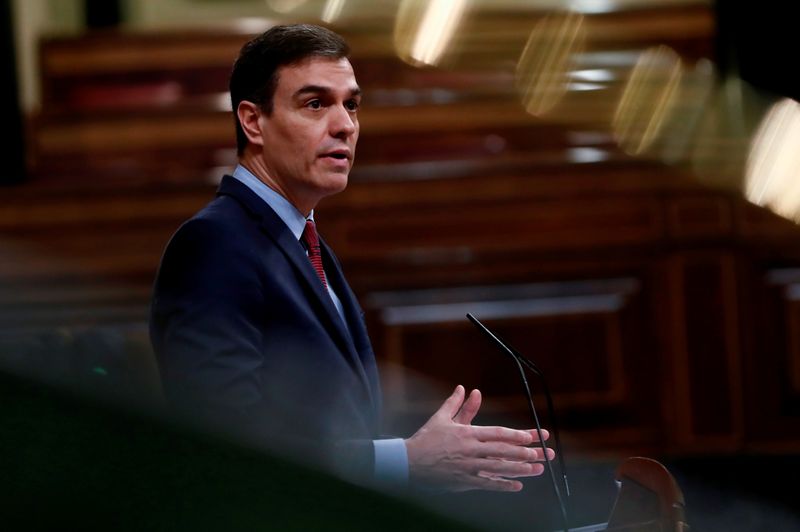MADRID/BRUSSELS (Reuters) – The Spanish government will propose to its European Union partners that they create a 1.5 trillion euro ($1.63 trillion) recovery fund financed through perpetual debt to aid countries worst-hit by the coronavirus crisis, a discussion paper shows.
Prime Minister Pedro Sanchez will outline the proposal to his EU colleagues during a videoconference summit on Thursday, a foreign ministry source told to Reuters.
The 27 EU countries are sparring with over how to finance recovery after an economic hit of the coronavirus, after the Netherlands and Germany ruled out common debt issuance.
Most are now looking to the bloc’s next joint budget for 2021-27, known as the Multiannual Financial Framework (MFF).
Worth around a trillion euros, it has not yet been approved by EU leaders and the discussion is whether to use it as a redistribution vehicle, with wealthier EU countries covering handouts for their worse-off peers, or create a complex financial vehicle to raise debt.
Under the Spanish proposal, the new fund would be financed by perpetual debt backed by the EU budget, and countries would count it as transfers and not debt.
“It would be a different mutualisation scheme than we had in mind…but it is an option that can be agreed by all,” the source said.
The European Commission would act as the main borrower in the scheme that would use the EU budget as a last resort to leverage the new debt.
DEVIL IN THE DETAIL
According to the three-page Spanish discussion paper, seen by Reuters, the transfer of funds should be frontloaded to start on the first day of 2021 and be executed during the next two to three years.
But the devil is in the detail, with EU member states now discussing if and how much joint debt could be raised by the MFF, what exactly would be the member states’ liability, how to spend any money raised that way and what maturities to go for.
“Perpetual debt is one for the dreamers,” said an EU official involved in preparing the leaders’ discussion later in the week. “It would be too big a leap, the EU works more step-by-step.”
Another question under discussion is whether any such EU cash would be loans to be repaid, or grants that are then forfeited.
Perpetual debt has no maturity date, with creditors receiving interest payments but the principal never repaid.
Spain wants the repayment of the interest to rely on a new set of European taxes, such as a border carbon tax and other green financing. Sanchez will ask the bloc to work towards a “full tax harmonization”.
The bloc has, however, so far mostly struggled to present a unified front in the face of the pandemic, squabbling over medical equipment and support for those worst-hit, or tightening border checks within what normally is Europe’s free travel zone.
It has relaxed state aid rules and limits on government spending to help the bloc cushion the blow of the coronavirus lockdowns, which have been introduced to slow the spread of the disease but also hit business activities hard.
The EU has agreed on a half-a-trillion euros rescue plan, but is still sparring over how to kickstart economic growth on the continent.
(Reporting by Belen Carreño and Inti Landauro, Additional reporting by Gabriela Baczynska, Editing by Andrei Khalip, Angus MacSwan and Alex Richardson)



















